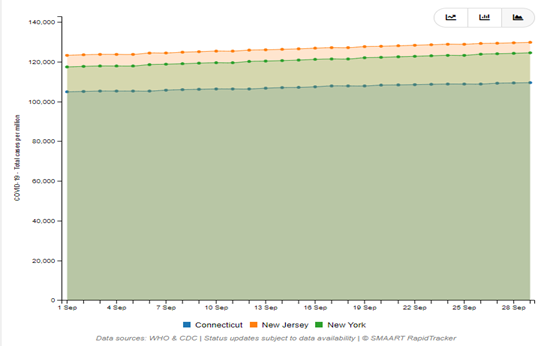
Population Health Informatics Program| October 2021

Senior Associate Dean
Student and Academic Affairs
Message
We’re very thankful for the positive feedback we’ve received from the launch of our first Digital Newsletter for the Population Health Informatics Program. I want to thank Rafaela Villacres, PHI Alum along with the PHIIRE Executive Committee, Erica Rowe-Owen, Sadaf Ahmad, and Kiyante Beaugris. We look forward to continuing to collaborate with you all and working towards scaling the program.
Table of Contents
- Informatics News
- Save the Date
- Research Highlight
- Global Health Informatics Tool
- Student Spotlight Series
- PHIIRE Club
Up-Coming PHI Talks for Which You Should Save the Date
Driving Digital Innovation with Data Analytics
October 19, 2021 | Webinar
Synthetic Health Data Challenge Winning Solutions
October 19, 2021 12 PM | Webinar
Emerging Health Information and Technologies Careers
October 26, 2021 12:30 PM | Webinar
November 3, 2021 12:00 – 3:30 PM | Webinar
PHI In The News
Patient portals tethered to electronic health records systems have become attractive web platforms since the enacting of the Medicare Access and Children’s Health Insurance Program Reauthorization Act and the introduction of the Meaningful Use program in the United States. With increasing adoption and patient engagement, the volume of patient secure messages has risen substantially, which opens new research and development opportunities for patient-centered care. This study aims to develop a data model for patient secure messages based on the Fast Healthcare Interoperability Resources (FHIR) standard to identify and extract significant information. Read More
Health information technology (HIT) regularly uses data-enabled infrastructure to support direct patient care, policy and planning, and public and population health. Timely, credible, reliable, and actionable data have always been vital to providing high-quality, equitable health care, both locally and globally. The pandemic underlined the importance of HIT support for the efforts needed to recognize, prevent, and control the pandemic, ensuring that decisions are well-informed, data-driven, and facilitate evidence-based policymaking. Read More
Highlights
- With the rapid pace of technological advancements, public health professions require a core set of informatics skills. The objective of the study is to integrate informatics competencies and job analysis to guide development of an evidence-based curriculum framework and apply it towards creation of a population health informatics program. We conducted content analysis of the Population Health Informatics related job postings in the state of New York between June and July 2019 using the Indeed job board. Read More
Predictors of COVID-19 Vaccine Acceptance, Intention, and Hesitancy: A Scoping Review
- COVID-19 vaccine is regarded as the most promising means of limiting the spread of or eliminating the pandemic. The success of this strategy will rely on the rate of vaccine acceptance globally. The study aims to examine the factors that influence COVID-19 vaccine acceptance, intention, and hesitancy. Gender, age, education, and occupation were some of the socio-demographic variables associated with vaccine acceptance. Variables such as trust in authorities, risk perception of COVID-19 infection, vaccine efficacy, current or previous influenza vaccination, and vaccine safety affected vaccine acceptance. Read More
Global Health Informatics Tool

COVID-19 Cases in the Tri-State Area
By: Erica Rowe-Owen
SMAART RapidTracker: New Tri-State Area Cases


SMAART RapidTracker: Vaccination Count in the Tri-State Area

Last Accessed October 8, 2021
For more visualizations, visit SMAART Rapid Tracker at smaartrapidtracker.org.
Interested in submitting your own visualizations, email rafaela.villacres63@sphmail.cuny.edu.
Student Recognitions
Ideation and Innovation

Rafaela Villacres with the knowledge and insights she gained from the MS Population Health Informatics program, co-founded PBC Labs, a software development company that has a niche interest in the conceptualization, design, and development of mobile health interventions. She serves as the product manager and leads a diverse team of engineers and designers to help consumers lead healthier and happier lives. One of their goals is to leverage information science, technology, and public health to reduce the gap in health disparities among underserved populations to improve population health outcomes.
PBC labs was one of eight teams in the CUNY Public Health Innovation Accelerator Summer 2021 cohort with Bloomelody™—a therapist-centric mobile health platform developed in Flutter (Android, iOS, Web). Bloomelody is a one-of-a-kind music educational tool that seeks to streamline the process of creating educational content, teaching, and tracking the progress of children with developmental delays. The mobile health platform employs a human-centered design approach and applied behavioral analysis therapy to bring music, visual aid, and fun to the classroom.

Bloomelody is grounded in evidence-based research highlighting that applied behavioral analysis therapy coupled with music intervention between the ages of 0-3 can improve learning ability and outcomes later in life for children with developmental delays helping them catch up to their peers. Early-intervention therapists and teachers were at the center of the design and development process employing a human-centered design approach to foster collaboration, innovation, and iteration. We hope that Bloomelody can help educators’ improve their day-to-day workflow to better support their students.
If you want to learn more about PBC Labs, visit BLOOMELODY: Learning through Music.
Student Spotlight

Melissa Ditmore is a second-semester student currently pursuing her MS Population Health Informatics degree. Her next book will address the roots of human trafficking in the United States (Beacon Press, forthcoming 2023). Her other publications include peer-reviewed journal articles, research reports, advocacy materials, and short pieces. She has spoken at the International AIDS Conference, the United Nations and many academic and informal meetings, the International Harm Reduction Association, and events convened by sex workers. She aspires to focus on gender-based violence with her new population health informatics skills. She holds a doctorate in sociology from CUNY Graduate Center. You can find more of her work at www.melissaditmore.com.
Student Blog

Key Differences between Public and Population Health Informatics: A Brief Review
By: Kiyante Beaugris
While population and public health informatics may be thought of as two sides of the same coin, key differences exist between the two. Public Health as a discipline focuses on individual needs, community-specific health assessment, the establishment of preventative public health programs addressing identified needs, and often related to infrastructure and government-level policymaking.
Public Health Informatics as a specialty, utilizes technology to facilitate these aims by promoting the creation, utilization, and evaluation of community resources on individual, community, and government levels. Public health informatics also aims to advance interoperability between personal and electronic health record systems to establish true continuity of care.
However, Population Health and Population Health Informatics exist on a broader spectrum and serve to address the needs of larger defined populations. Kharrazi et. al 2017, note the ability to understand the needs that exist within specific geographic areas, and the capacity for evidence-based decision-making, as benefits of population health informatics.
While population health informatics also utilizes information technologies, it does so with the goal of integrating data and information to address the social determinants of health that influence health outcomes and drive population-level disparities. Data utilized on this scale is often harvested from several public health resources, including governmental and organizational sources.
Population Health Informatics Innovation, Research & Education (P.H.I.I.R.E) Presents

The Population Health Informatics Innovation, Research, and Education (PHIIRE) Club initiated by students of the MS Population Health Informatics program at CUNY Graduate School of Public Health and Health Policy is launching on Friday, November 19, 2021, the PHIIREATHON: An Ideation to Innovation Impact Event to address COVID-19 Vaccine Hesitancy.
This initiative is in collaboration with PBC Labs which is founded by Rafaela Villacres, one of the first alumni cohorts of the MS Population Health Informatics program. She serves as the co-founder and product manager of this innovative start-up that aims to enhance the accessibility of technology to improve the health and well-being of underserved populations through mobile health interventions.
This is an opportunity for public health and informatics students to gain experience and training in informatics principles, problem-solving skills, entrepreneurship, leadership/teamwork, and communication skills. We want to empower students to foster their creative, critical thinking, and technological skills to tackle the public health challenges that arise post-COVID-19 and beyond.
Initial Screening Criteria
- Problem statement (5 points)
- Background
- Significance and Relevance
- Objective
- Technology (10 points)
- Digital health solution
- Innovation proposed
- Implementation
- Impact (10 points)
- Outcomes assessed
- Community impact
- Presentation (10 points)
- Information Communicated
- Quality of Delivery
The best 10 ideas will be invited for presentations on November 19, 2021.
Individuals will present information on the solution proposed, team composition, their implementation plan, the metrics of evaluation, and the community impact of the solution proposed.
Winners will be awarded a stipend after a delegation from a panel of judges with experience in public health research and entrepreneurship.
Applications Open Next Week!!
Stay Tuned for Further Updates!
Join Us!
- To submit your contributions to this newsletter, contact rafaela.villacres63@sphmail.cuny.edu.
- Submit content here!
- To join the PHIIRE Club, contact Erica.Rowe-Owen66@sphmail.cuny.edu
- Visit Our Website
- Join the PHIIRE Club



